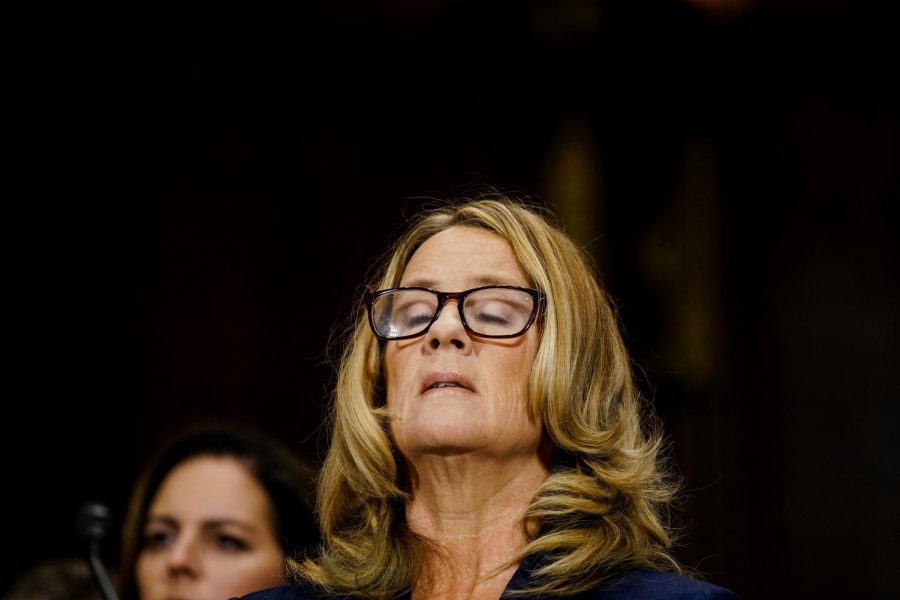McComas: As Time’s Most Influential, Christine Blasey Ford’s powerful message prevails
The release of Time’s most 100 influential people sheds light on corruption and women’s movements throughout the United States.
Christine Blasey Ford takes a breath at a Senate Judiciary Committee hearing on Thursday, Sept. 27, 2018 on Capitol Hill in Washington, D.C. (Melina Mara/Pool/Abaca Press/TNS)
April 24, 2019
Time magazine announced its 100 Most Influential People on April 17 and political figures ranging from New York Rep. Alexandria Ocasio-Cortez to Special Counsel Robert Mueller were included in the famous list, with many others in between. I thought the most interesting pairing from the list was the combination of Supreme Court Justice Brett Kavanaugh and Christine Blasey Ford, who accused Kavanaugh of sexual misconduct.
There is no question that both Ford and Kavanaugh created widespread movements with their conflicting messages last fall. The influencers stood for two different ideologies — believing survivors and the rise of false accusations. Though Kavanaugh now sits on the U.S. Supreme Court, Ford revamped a women’s movement that brought vital attention to corruption in our American institutions and our expectations of men in general.
RELATED: Nadler: The Supreme Court seems a bit less supreme now
By coming out as a victim to someone who was in a position to gain a great deal of judicial power, Ford’s testimony added a whole new layer to the #MeToo movement that was already established in the workplace. Ford made an incredible impact on women and men across the country with her bravery in speaking out in an intimidating setting encompassing many legalities, media outlets, opinions, and threats. Ford called for true justice in the justice system, an idea that resonated with the American people.
Not only did she recall her encounters with Kavanagh, but Ford also represented thousands who have been in the same position with men who possess strong credentials, supporters, and finances. The difference here was that Ford had to step into an unwanted national spotlight and give her accounts to try to persuade a jury filled with senators who already had their minds set against her. Her ability to stand strong and speak confidently under the unimaginable pressures of a Senate Judiciary Committee hearing stimulated a far-reaching campaign for the U.S. Senate to reject Kavanaugh’s confirmation.
RELATED: Sen. Grassley confirmed he received death threats for his support of Kavanaugh
There’s no question that Kavanaugh also deserved a spot on Time’s list. He affected the nation when he shot down the sexual-assault allegations and represented a widespread group of white men. He sparked a conversation about the portrayal of white men in the media and how that demographic group is often misperceived in times of female empowerment. Kavanaugh’s outcry of innocence made many believe that Ford’s claims were purely political and tied to the motivations of the Democratic Party.
RELATED: Cappel: Key takeaways from the Mueller Report
Nonetheless, Kavanaugh now sits on the Supreme Court and will make influential decisions for years to come. However, I may never think of Kavanaugh without also thinking of Ford — an indicator of the power within her message and the extent to which it will live on during his tenure as a justice on the nation’s highest court. If Time’s 100 Most Influential People were to be ranked, I would hope to see Ford higher on the list than Kavanaugh, as she proved herself a major influence in a vital nomination and established a movement against the unacceptable boy-will-be-boys mentality that has, in many cases, justified sexual assault.







